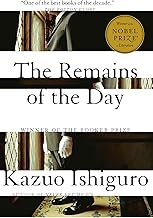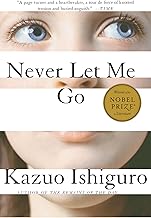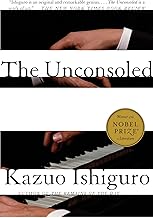
How to Read Kazuo Ishiguro's Books on Best novels
How to Read Kazuo Ishiguro's Books on Best Novels
Estimated Reading Time: 10-12 minutes
Introduction
Kazuo Ishiguro, a Nobel Prize-winning author, is celebrated for his profound exploration of memory, identity, and the human condition. Born in Nagasaki, Japan, and raised in the UK, Ishiguro's unique cultural background informs his storytelling, blending Eastern and Western sensibilities. His novels often delve into the complexities of personal and collective histories, making his perspective on the theme of "Best novels" both unique and valuable.
Ishiguro's works reflect the anxieties and aspirations of contemporary society, often set against historical backdrops that resonate with universal themes. His ability to evoke deep emotional responses while maintaining a subtle narrative style positions him as a significant voice in modern literature. This guide will examine three of his most acclaimed novels—The Remains of the Day, Never Let Me Go, and The Unconsoled—to highlight their contributions to the theme of "Best novels."
Why Kazuo Ishiguro's Perspective Matters
Ishiguro's approach to literature is distinctive for its introspective nature and philosophical depth. Unlike many contemporary authors who may focus on overt action or dramatic plots, Ishiguro invites readers to reflect on the nuances of life, the fragility of memory, and the ethical dilemmas of existence. His characters often grapple with their pasts, seeking meaning in the choices they have made, which resonates deeply with readers navigating their own life experiences.
What sets Ishiguro apart is his ability to blend the personal with the political, exploring how individual lives intersect with broader societal issues. His works challenge readers to confront uncomfortable truths about humanity, making his insights not only relevant but essential for understanding the complexities of modern life.
Overview of Recommended Books
The Remains of the Day
The Remains of the Day is a poignant exploration of duty, regret, and the passage of time, narrated by Stevens, an English butler who has dedicated his life to serving Lord Darlington. Set in post-World War II England, the novel unfolds as Stevens embarks on a road trip to visit Miss Kenton, a former housekeeper, prompting him to reflect on his life choices and the sacrifices he made for his profession.
Main Themes and Arguments
The central themes of The Remains of the Day include:
- Memory and Regret: Stevens's recollections reveal the emotional toll of his unwavering loyalty to Lord Darlington, leading to profound regrets about missed opportunities for personal happiness.
- Dignity and Duty: The novel examines the concept of dignity in service, questioning whether true fulfillment can be found in self-denial.
- The Passage of Time: Ishiguro poignantly captures the fleeting nature of time and how it shapes our identities and relationships.
Historical Context and Significance
Written in 1989, the novel reflects the shifting social landscape of post-war Britain, a time when traditional values were being questioned. Ishiguro's portrayal of a bygone era serves as a commentary on the impact of historical events on individual lives.
Key Insights and Takeaways
- The Importance of Self-Reflection: Stevens’s journey serves as a reminder of the necessity of self-examination in understanding one’s life choices.
- The Cost of Professionalism: The novel critiques the notion of professionalism at the expense of personal happiness, encouraging readers to evaluate their own priorities.
- Emotional Resilience: Ishiguro illustrates how individuals cope with regret and loss, offering insights into emotional resilience.
Why Read This Book:
The Remains of the Day is essential for understanding the complexities of human relationships and the weight of past decisions. It appeals to readers interested in character-driven narratives and philosophical explorations of life’s meaning. Those seeking to reflect on their own life choices will find this novel particularly resonant.
Never Let Me Go
In Never Let Me Go, Ishiguro presents a dystopian narrative that raises profound ethical questions about humanity, cloning, and the value of life. The story follows Kathy, Tommy, and Ruth, who grow up in Hailsham, a seemingly idyllic boarding school that harbors dark secrets about their true purpose.
Main Themes and Arguments
The novel grapples with themes such as:
- Identity and Humanity: Ishiguro questions what it means to be human, exploring the characters’ struggles for identity in a society that views them as mere organ donors.
- Love and Friendship: The complex relationships among the characters highlight the importance of connection in the face of existential despair.
- Mortality and Acceptance: The narrative confronts the inevitability of death, prompting readers to reflect on their own lives and the choices they make.
Historical Context and Significance
Published in 2005, Never Let Me Go resonates with contemporary debates about biotechnology and ethics. Ishiguro’s vision serves as a cautionary tale about the potential consequences of scientific advancements without moral considerations.
Key Insights and Takeaways
- The Fragility of Life: The novel emphasizes the preciousness of life and the importance of cherishing relationships.
- The Ethics of Science: Readers are encouraged to consider the ethical implications of scientific progress and the value of human life.
- The Power of Memory: Kathy’s reflections underscore the significance of memory in shaping identity and understanding one’s place in the world.
Why Read This Book:
Never Let Me Go is crucial for those interested in ethical dilemmas and the implications of scientific advancements. It appeals to readers who enjoy thought-provoking narratives that challenge conventional notions of humanity and morality.
The Unconsoled
The Unconsoled is Ishiguro's most experimental work, blending surrealism and existential inquiry. The story follows Ryder, a pianist who arrives in an unnamed European city for a concert but becomes ensnared in a series of bizarre encounters and conversations that blur the lines of reality.
Main Themes and Arguments
Key themes include:
- Alienation and Dislocation: Ryder’s experiences reflect feelings of disconnection and the search for belonging in a confusing world.
- The Nature of Art: The novel explores the relationship between art and life, questioning the purpose and impact of artistic expression.
- Memory and Identity: As Ryder navigates the city, his fragmented memories reveal the complexities of self-identity and the influence of the past.
Historical Context and Significance
Published in 1995, The Unconsoled reflects the anxieties of a postmodern world, where individuals grapple with the overwhelming pace of change and the search for meaning in an increasingly fragmented society.
Key Insights and Takeaways
- Embrace Uncertainty: The novel encourages readers to accept the ambiguity of life and the complexities of human experience.
- Art as a Reflection of Life: Ishiguro suggests that art can illuminate the human condition, offering insights into our struggles and aspirations.
- The Search for Connection: Ryder’s journey emphasizes the importance of human connection in navigating the uncertainties of existence.
Why Read This Book:
The Unconsoled is essential for readers interested in experimental literature and philosophical explorations of identity and art. Its surreal narrative invites readers to engage with complex ideas about existence and the human experience.
How These Books Complement Each Other
Together, these three novels present a multifaceted exploration of the human condition. The Remains of the Day offers a reflective look at memory and regret, while Never Let Me Go confronts ethical dilemmas in a dystopian context. The Unconsoled challenges readers with its surreal narrative, prompting deep philosophical inquiries. Reading them in conjunction provides a comprehensive understanding of Ishiguro's exploration of identity, memory, and the complexities of life.
Who Would Benefit from Reading These Books
These works appeal to a diverse audience, including:
- Students and Academics: Those studying literature, philosophy, or ethics will find rich material for analysis and discussion.
- General Readers: Anyone interested in thought-provoking narratives that explore the human experience will appreciate Ishiguro's insights.
- Professionals Seeking Practical Wisdom: Readers looking for reflections on duty, identity, and personal growth will find valuable lessons.
- Anyone Seeking Personal Growth: Those on a journey of self-discovery will resonate with the themes of memory, regret, and the search for meaning.
Recommended Reading Order
- Start with: The Remains of the Day - This novel provides a foundational understanding of Ishiguro's themes of memory and regret, making it an accessible entry point.
- Continue with: Never Let Me Go - Building on the exploration of identity and ethics, this book deepens the reader's engagement with the complexities of humanity.
- Advanced reading: The Unconsoled - This experimental work challenges readers to confront the surreal aspects of existence, offering a more profound philosophical inquiry.
Tips for Getting the Most Out of Each Book
- Take notes on key themes and characters as you read to enhance your understanding.
- Reflect on how the themes resonate with your own life experiences.
- Discuss the books with others to gain different perspectives and insights.
Conclusion
Kazuo Ishiguro's contributions to the theme of "Best novels" are invaluable, offering profound insights into the human condition through the lens of memory, identity, and ethical dilemmas. His works challenge readers to confront their own lives and choices, making them timelessly relevant. As you explore these novels, allow yourself to reflect on their themes and how they resonate with your own experiences. Dive into Ishiguro's world and discover the richness of his literary contributions—each page offers an opportunity for personal growth and deeper understanding.
Tags: #KazuoIshiguro #BestNovels #Philosophy #ReadingGuide #ClassicLiterature #Wisdom
Featured Books

The Remains of the Day
by Kazuo Ishiguro
Published: 1989
BOOKER PRIZE WINNER • From the winner of the Nobel Prize in Literature, here is “an intricate and dazzling novel” (The New York Times) about the perfect butler and his fading, insular world in post-World War II England. This is Kazuo Ishiguro's profoundly compelling portrait of a butler named Stevens. Stevens, at the end of three decades of service at Darlington Hall, spending a day on a country drive, embarks as well on a journey through the past in an effort to reassure himself that he has served humanity by serving the "great gentleman," Lord Darlington. But lurking in his memory are doubts about the true nature of Lord Darlington's "greatness," and much graver doubts about the nature of his own life. Read more

Never Let Me Go
by Kazuo Ishiguro
Published: 2005
NOBEL PRIZE WINNER • From the acclaimed, bestselling author of The Remains of the Day comes “a Gothic tour de force" (The New York Times) with an extraordinary twist—a moving, suspenseful, beautifully atmospheric modern classic.One of The New York Times’s 10 Best Books of the 21st Century • A Kirkus Reviews Best Fiction Book of the Century • A Los Angeles Times Best Fiction Book of the Last 30 YearsAs children, Kathy, Ruth, and Tommy were students at Hailsham, an exclusive boarding school secluded in the English countryside. It was a place of mercurial cliques and mysterious rules where teachers were constantly reminding their charges of how special they were. Now, years later, Kathy is a young woman. Ruth and Tommy have reentered her life. And for the first time she is beginning to look back at their shared past and understand just what it is that makes them special—and how that gift will shape the rest of their time together. Read more

The Unconsoled
by Kazuo Ishiguro
Published: 1995
From the winner of the Nobel Prize in Literature and author of the Booker Prize–winning novel The Remains of the Day, here is a novel that is at once a gripping psychological mystery, a wicked satire of the cult of art, and a poignant character study of a man whose public life has accelerated beyond his control. The setting is a nameless Central European city where Ryder, a renowned pianist, has come to give the most important performance of his life. Instead, he finds himself diverted on a series of cryptic and infuriating errands that nevertheless provide him with vital clues to his own past. In The Unconsoled Ishiguro creates a work that is itself a virtuoso performance, strange, haunting, and resonant with humanity and wit. Read more